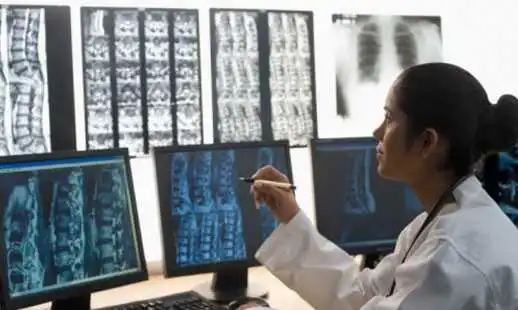Subspecialty radiology reporting is critical in delivering highly accurate and detailed diagnostic reports, particularly in complex cases that require specific expertise. These reports are generated by radiologists who have undergone extensive training in particular subspecialties such as neuroradiology, musculoskeletal radiology, and cardiothoracic imaging. This focused expertise allows for more precise interpretations, leading to better-informed clinical decisions and improved patient outcomes.
Enquire Us for Subspecialty and Elective Support
Teleradiology Solutions Subspecialty Expertise
As the scope of medical imaging continues to expand, the demand for specialized radiological expertise has become increasingly vital. Subspecialty radiologists, with their advanced training and fellowship experience, are crucial for interpreting complex scans, leading to more accurate diagnoses and improved patient outcomes.


Advantages of Subspecialty Reporting
Enhanced Diagnostic Accuracy
Subspecialty radiologists are more adept at identifying subtle findings that might be overlooked by general radiologists. For example, a neuroradiologist’s expertise in brain and spine imaging allows them to detect complex neurological conditions with greater accuracy.
Improved Patient Outcomes
Accurate and detailed reports from subspecialists enable clinicians to devise more effective treatment plans. This is particularly important in areas such as oncology, where precise imaging is crucial for staging and treatment planning.
Timely and Reliable Reports
Subspecialty teleradiology services often boast quick turnaround times, ensuring that reports are available when needed. This is vital for both routine diagnostics and emergency care, where timing can significantly impact patient outcomes.
Elective Subspecialties
Our elective radiology services focus on outpatient imaging for non-emergent diagnoses. By concentrating on specific areas of the body, our subspecialist radiologists provide detailed assessments that lead to more effective treatment plans and enhanced patient outcomes.

Elective Neuroradiology Reporting
In elective settings, neuroradiology focuses on non-emergent conditions like multiple sclerosis (MS), where imaging identifies brain and spinal lesions for management. MRI and CT scans assess brain tumors, guiding treatment. Spinal imaging detects degenerative changes, aiding in pain management. Neurodegenerative diseases, such as Parkinson’s and Alzheimer’s, are monitored through brain imaging for diagnosis and progression tracking.

Musculoskeletal Radiology
Our musculoskeletal radiologists focus on imaging bones, joints, and soft tissues, delivering expert interpretations to assist in diagnosing and treating musculoskeletal disorders.

Pediatric Radiology

Cardiothoracic Radiology
With a focus on the heart, lungs, and thoracic cavity, our cardiothoracic radiologists provide comprehensive evaluations essential for cardiac and respiratory care.
Emergency Subspecialties
Our trauma-specialized radiologists are experts in providing immediate, accurate assessments for critically injured patients. Using advanced imaging techniques, they swiftly diagnose traumatic injuries to the brain, spine, chest, abdomen, and musculoskeletal system, ensuring rapid and precise evaluations crucial for effective emergency care.

Body Imaging
Body Imaging focuses on the chest, abdomen, and pelvis, using advanced techniques to diagnose and monitor a wide range of conditions. This specialty plays a crucial role in early disease detection and treatment, including conditions of the lungs, liver, kidneys, and digestive organs.

Emergency Neuroradiology Reporting
In emergency cases, neuroradiologists diagnose acute conditions like stroke, using rapid imaging for immediate treatment. Traumatic brain injury (TBI) is assessed to determine the extent of damage, while subarachnoid hemorrhage (SAH) and acute spinal cord compression are quickly identified for life-saving interventions.
Benefits of Our Subspecialty Teleradiology Services

Accurate Diagnoses
Our high-quality imaging and expert interpretations lead to reliable diagnoses, supporting effective treatment planning.

Personalized Patient Care
Our radiologists offer tailored interpretations, ensuring each patient receives the highest quality diagnosis and care, customized to their unique needs.

Customized Solutions
We offer teleradiology services that meet your practice’s specific needs, whether you require temporary coverage, second opinions, or ongoing subspecialty support.

Quality Assurance
We implement rigorous quality assurance protocols, including regular peer reviews and performance evaluations, to maintain the highest standards in radiological interpretations.

Access to Expert Board-Certified Radiologists
Our subspecialist radiologists are board-certified experts with comprehensive training in their respective fields, ensuring precise and reliable interpretations.

Cutting-edge Technology
We utilize state-of-the-art imaging technologies and secure, HIPAA-compliant platforms to ensure high-quality image transmission and data security. Our systems integrate seamlessly with your existing workflows, enhancing efficiency.

Continuing Education
Our radiologists stay current with the latest advancements through ongoing education, ensuring they provide the most advanced diagnostic services available.
